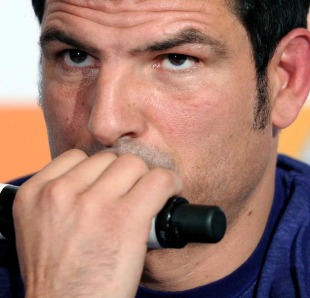|
Comment
French unpredictability
Ian Moriarty
July 27, 2011

Lieveremont's arrival was hoped to herald in a new era of dominance for French rugby
© Getty Images
Enlarge
So, we're nearly four years into Marc Lièvremont's reign as French coach yet none of us really know whether it will be champagne or some nasty Fronton that will be served up at the World Cup in a few months' time. Feted for their unpredictability over the course of history, Lièvremont's time as top dog has seen France only become predictable in the context of serving up sub-par performances, culminating in that 22-21 Six Nations defeat to Italy last March. Monikers can be a lazy tool when attempting to describe national sporting traits and styles, and are nearly always wide of the mark or too simplistic. Yet nations continue to be bound to them, as if a single word could adequately describe the differences between us all. The Welsh, we are told, have their 'Welsh way' although it's still not entirely clear if anyone has seen it since the 1970's. The Irish regularly get annoyed when a foreigner mentions 'passion', 'pride' or 'plucky'. The All Blacks get by with 'ruthlessly efficient' and 'guardians' of the game but go nuts when someone mentions the tag which will not be spoken - 'ch*kers' . Meanwhile France are 'unpredictable', a rugby nation feted for doing what no one else can or will do. We think of 'l'essai du bout du monde' that beat the All Blacks in 1994. We think of the romance and the beauty of the game. The French, so unpredictable… But there is a problem. You see, being 'unpredictable' is for losers. It might be entertaining for neutrals to see a team turn up and do the unexpected (as France did again against the All Blacks in 1999, 2007 and 2009) but it rarely engenders the type of self-belief necessary to win World Cups. France have made two World Cup finals over the course of their history yet only the most one-eyed supporter could deny that they've never really looked like a side that believed they could win the Webb-Ellis Cup. Blessed with some wonderful talents and huge resources, France have, if truth be told, been locked in a psychological second division alongside teams like Wales and joined in recent years by the likes of Ireland and Argentina. Some might say the reasons for this lie deep in the French psyche but that hasn't stopped the country from doing well in other sports. It's only a decade or so since France simultaneously held both World Cup and European Championship titles in football while they are the current reigning European Champions, Olympic Champions as well as double defending World Champions in handball (don't snigger - it's a big sport in mainland Europe). Perhaps it's an inability to deal with what the public expects its rugby players to be. True to its cultural differences with the mainly Anglophonic rugby world, there are many who see rugby as an art form to be cherished and adored. Winning becomes irrelevant in this case, as can be seen by the muted reaction to France's dysfunctional 2010 Grand Slam win. Phrases like le rugby panache, la grâce and la beauté suggest a game that is more than a game, and don't lend themselves all that well to grinding out one point victories.
Nothing has outwardly changed with France under Marc Lièvremont. There were those who believed that the advent of professionalism would allow the French to deliver more consistently on their undoubted potential and for a while it looked that way. Under Uncle Bernie Laporte, France won four Six Nations in eight years, thanks to much improved discipline and an ultra-orthodox ethos. Yet Laporte was hounded from pillar to post for his methods and when Marc Lièvremont arrived on the precipice in late 2007, he promised that he would put the flair back into French rugby. Four years later and we're still waiting. Lièvremont's teams have been called many things but the traits that win Cups are still missing in action. There is no consistency, in performance, tactics or selection. There is no flair or panache either, despite the odd, rare moment of individual brilliance. Most of all however, there is still no vision from the young coach of how he wants the game played. No one knows what the XV de France stands for under Lièvremont, except for the fact that there will be fifteen guys on the pitch. What is sure is that it will be the best conditioned France side to ever compete in a World Cup. Lièvremont's 33-man squad has spent most of July in camp, access that no French coach has ever had before. In addition, Biarritz pair Fabien Barcella and Imanol Harinordoquy are back in training, a fillip for the side as they prepare ahead of their clash with Ireland in Bordeaux on August 13. The French public continue to live in hope that this was all just part of a massive ploy to draw the All Blacks, South Africa et al into a false sense of security. Somehow that's a little unlikely. At a time when French club rugby is growing in popularity at a massive pace, it seems bizarre that the national team will go to New Zealand at such a low ebb. Unpredictable France? We know we'll get that but it would be nice to see a bit of old-fashioned French flair again also… © ESPN Sports Media Ltd.
| |||||||||||||||
Live Sports
Communication error please reload the page.
-
Football
-
Cricket
-
Rugby
-
- Days
- Hrs
- Mins
- Secs
F1 - Abu Dhabi GP
Abu Dhabi Grand Prix December 11-131. Max Verstappen ()
2. Valtteri Bottas (Mercedes)
3. Lewis Hamilton (Mercedes)
4. Alexander Albon ()
5. Lando Norris ()
6. Carlos Sainz Jr ()
-
ESPNOtherLive >>
Snooker - China Open
Tennis - Miami Open

